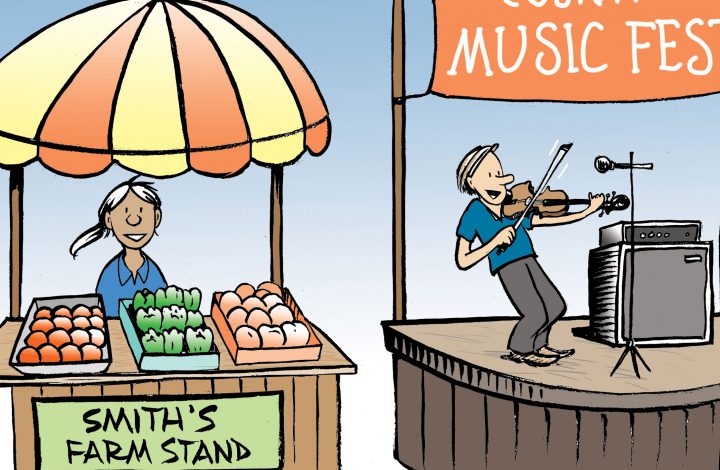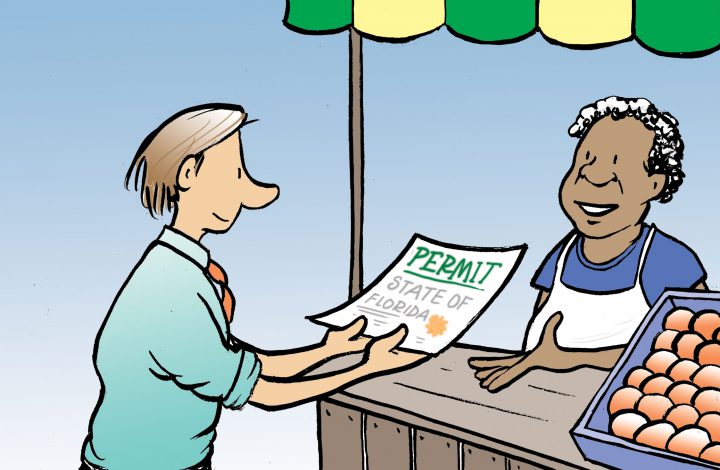A big part of planning a farmers' market business is deciding how to sell the food product. This decision may require extra permits and regulations.
The three main ways to sell food in Florida are cottage food sales, retail food sales, and wholesale distribution. Cottage food sales refer to a limited list of food products that can be legally produced in the home and sold directly to consumers without state licensing or permits. Licensed retail food sales refer to food sold directly to the consumer by a licensed and inspected food business.
Wholesaling refers to food products sold to a third party, such as a store or restaurant, that is in turn sold to consumers by the third party. Each mode of sales is regulated by specific state and federal inspection and permitting guidelines covered in the Business Permits guide on this website. This guide will address how to weigh the business pros and cons for each mode of sale when planning a farmers’ market business by offering a brief overview of each strategy and comparing some of the advantages and disadvantages of cottage food, retail, and wholesale food production.*
Cottage Food Sales
A cottage food business is an inexpensive and easy way to start a food business in Florida. State laws allow certain foods that are considered to be non-hazardous (such as baked goods, candies, jams, dry herbs, dry pasta and cereals, nuts, and popcorn) to be produced in a home kitchen and sold by the producer at farmers’ markets, festivals and other direct-to-consumer sales outlets without inspections or permits.
The legal exemption for cottage foods makes cottage food a great way to start a food business because it does not require more expensive investments in licensing and inspection. However, cottage food businesses are limited in the type and quantity of products that can be sold in farmers’ markets, and cottage food sales are not allowed at venues such as restaurants or retail stores. Therefore, a big benefit to cottage food production is that it is a cheap and easy way to start or test out a food business concept before making a heavy financial investment. One main drawback of a cottage food business is the limit on the types of products and where they can be sold.
Although the legal regulations in a cottage food operation are relaxed, state law requires all cottage foods to be prepackaged and labeled with the address and name of the cottage food operation, name of the product, ingredients (ordered by weight), the net weight (or volume) of the product, allergen information, and ‘Made in a cottage food operation that is not subject to Florida’s food safety regulations’ printed in at least 10 point font and in a contrasting color to the label.
Cottage Foods
| Advantages |
Disadvantages |
| Low start-up cost |
Limited income potential |
| Relaxed regulations |
Limited set of permitted products |
| Can use home kitchen |
Limited venues to sell products |
| Ability to test business before investing greater money |
No wholesaling or selling in retail shops |
| Florida is cottage food friendly |
Can’t sell outside of Florida state lines |
| Direct-to-consumer sales |
Cannot sell non-cottage food items |
Retail Food Sales
Retail food sales require more financial investment to comply with state and federal rules and gain access to a permitted kitchen. At the same time, a small investment into retail sales allows a food business to expand the variety of products offered and the new products can then be sold at a range of different venues; this expansion into retail creates more opportunity to make sales and turn a profit. It is important to weigh the costs and benefits of retailing.
The costs associated with retail sales include building or purchasing access to a state-permitted kitchen, acquiring the licenses and permits from the appropriate state regulatory agency, and obtaining food safety certification for employees. Once a food business undergoes state inspection and receives a license to retail, all food produced and sold by the business must be prepared in a state-permitted commercial kitchen. This means that a retail food business must either invest in building and operating its own commercial kitchen or enter into a ‘commissary agreement’ with someone who operates a commercial kitchen and rents the kitchen for others to access.
Most commissary kitchens charge a fee based on the amount of hours a food business will use the kitchen. This means that the cost of accessing the kitchen will increase as production increases and the business grows. The business may reach a production point where it is more expensive to pay an hourly fee to a commissary than it is to build and permit a commercial kitchen, lease a kitchen from a former cafe or restaurant and have it permitted, or cooperatively share a commercial kitchen with other small food businesses.
Visit the Kitchens guide for more information on choosing a kitchen.
Retail sales in Florida allow vendors to sell a broader spectrum of food products in Florida farmers’ markets. Retail permits allow the sale of food that does not fall into the cottage food category such as seafood, meat, dairy, juices, sauces, ice cream, and cut produce. The ability to expand the number and type of food products through retail can make a business more competitive by providing opportunities to fill a niche in the market by creating a new food product based on consumer trends.
Retail sales also allow food producers to value-add products using processing techniques that are not allowed in cottage foods such as fermenting, using dairy products, creating sauces, flavoring oils, or canning. Licensed retailing also creates additional opportunities to sell food products at sales venues other than farmers’ markets and festivals such as indoor food boutiques and in restaurants and shops.
Retail Foods
Advantages
|
Disadvantages
|
| Increase opportunity for revenues |
Greater monetary investment |
| Expand market potential |
Requires inspections and permits |
| Greater customer visibility |
Requires commercial kitchen |
| Greater variety of product |
Labor intensive |
Similar to a cottage food operation, a licensed retail food vendor must sell products directly to the consumer. Direct-to-consumer sales allow a food business to make the greatest profit by selling at the maximum retail value of the product rather than
discounting the product for wholesale orders. Direct sales also enable the food business to be more competitive and sell at the lowest price possible by cutting out the ‘middle man.’ Direct sales also create an opportunity to establish a relationship with customers and build a consumer base.
At the same time, a licensed retailer needs to invest time and labor into producing and selling products. Sales demand a significant emotional investment to be friendly, personable, engaging and appealing to customers; every single day, excellent customer service is important for the growth of the business.
It is not unusual for a new business owner to learn that while they love baking cakes, they do not enjoy selling cakes. This makes it important to weigh the costs and benefits of becoming a licensed retailer – and perhaps testing the business as a cottage food operation first, if possible – prior to investing in retail food sales.
A licensed food retailer should also consider carrying limited liability insurance, registering the business with the State of Florida, and obtaining any local occupational licenses if necessary. For more information on business licenses and permits, visit our Business Permits guide.
Wholesaling Food
Wholesaling is a business operation that sells food products to a third party (usually an existing retailer or restaurant) who then distributes the product or retails the product directly to consumers. A food business may produce food for wholesale and retail at the same time by offering bulk quantities at a price that is low enough for a third-party retailer or distributor to resell at a profit.
Advantages
|
Disadvantages
|
| Sell in bulk quantities |
Products sold at lower price point |
| May compliment retail activities |
Stricter processing regulations |
| Greater distribution of products |
Demand specific packaging, storage, analysis, etc. |
| Establish partnerships with fellow businesses |
Requires higher production capacity |
| Little to no interaction with the general public |
Increased food safety requirements |
Some food producers may find wholesaling less difficult because the producer does not need to invest time and labor into retailing items one-by-one to the general public. At the same time, the profit margin for individual items is lower in a wholesale operation and state food safety regulators require a separate permit with a more in-depth inspection procedure because wholesale products need to be able to maintain quality and safety as they are transferred and distributed along the food chain.
A critical part of a wholesale food operation is being able to increase production enough to supply large amounts of product. Prior to engaging in a wholesale operation, it is important to identify the production capacity and any additional costs and activities incurred by transitioning into wholesaling such as packaging and labeling, storage, shelf-life analysis, lot coding and recall procedures, and food safety regulations such as HACCP and sanitation. In addition, the criteria for wholesaling certain potentially hazardous food products, such as prepared foods containing seafood and meat, may be difficult to achieve.
Cottage, Retail, or Wholesale for your Farmers’ Market Business
The decision to sell food through cottage, retail, and/or wholesale modes depends on the specific needs of the entrepreneur and the resources available to the farmers’ market business. Each mode offers different advantages and disadvantages, and a good business and financial plan can help a food business operator decide which model is the best fit for the current activities of the business as well as the potential to expand and grow the business. For more information on topics in issues related to cottage, retail and wholesale operations, visit the Business Permits, Business Plans, and Sales Venues guides on this website.
References and Resources
UF IFAS: Q and A: Understanding Cottage Food
Cottage Food Industry in Florida (FDACS 2014 handout)
Cottage Food Guidance (FDACS 2017 Handout)
Fresh From Florida Retail Food Program
How to Build a Wholesale Food Company, chron.com
Retail versus Wholesale Business Models – Quickbooks
Wholesale Business Basics – Quickbooks
‘Home Cooks Turn their Passions into Cash’ (video) Orlando Sentinel
*This guide is not intended to serve as a substitute for legal advice. For all individual questions and concerns please consult a licensed attorney and contact the relevant agencies concerning your specific legal and regulatory requirements.
This page was authored by Sarah Cervone with content contributed by Nadia Alcide and edited by Thomas Maple & Andi Emrich.
Published July 2019.
Reproducible for non-commercial use only courtesy of Florida Organic Growers, Florida Farmer's Market Association and the United States Department of Agriculture






